Bios 242 assignment - Study guides, Class notes & Summaries
Looking for the best study guides, study notes and summaries about Bios 242 assignment? On this page you'll find 101 study documents about Bios 242 assignment.
Page 2 out of 101 results
Sort by
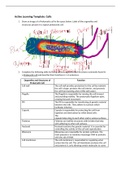
-
BIOS 242 Week 2 Assignment; Cells
- Other • 4 pages • 2023
- Available in package deal
-
- $18.49
- + learn more
1. DrawanimageofaProkaryoticcellinthespacebelow.Labelalltheorganellesandstructurespresentin atypicalprokaryotic cell. 2. CompletethefollowingtablebylistingvariousorganellesandstructurescommonlyfoundinaProkaryoticcellanddescribe theirfunctionsin 1-2sentences. 3. DrawanimageofaEukaryoticcellinthespacebelow.Labelalltheorganellesandstructurespresentin atypicalEukaryotic cell. 4. CompletethefollowingtablebylistingvariousorganellesandstructurescommonlyfoundinaEukaryoticcell and describetheirfunctio...
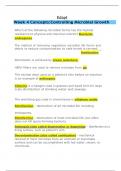
-
BIOS 242 Week 4 Assignment; Concepts; Controlling Microbial Growth.
- Exam (elaborations) • 11 pages • 2024
-
- $8.49
- + learn more
BIOS 242 Week 4 Assignment; Concepts; Controlling Microbial Growth. Prepare: Controlling Microbial Growth The sterilizing gas used in chemiclaves is . HEPA filters are used to remove microbes from Which of the following microbial forms has the highest resistance to physical and chemical controls? Sterilization is achieved by The method of removing vegetative microbial life forms and debris to reduce contamination to safe levels is termed is a halogen used in gaseous and liq...
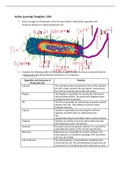
-
BIOS 242 Week 2 Assignment; Cells
- Other • 4 pages • 2023
- Available in package deal
-
- $25.49
- + learn more
1. Draw an image of a Prokaryotic cell in the space below. Label all the organelles and structures present in a typical prokaryotic cell. 2. Complete the following table by listing various organelles and structures commonly found in a Prokaryotic cell and describe their functions in 1-2 sentences. 3. Draw an image of a Eukaryotic cell in the space below. Label all the organelles and structures present in a typical Eukaryotic cell. 4. Complete the following table by listing various organelles ...

-
BIOS 242 Week 1 Assignment; Golden Age and Macromolecules
- Other • 8 pages • 2024
-
- $9.99
- + learn more
BIOS 242 Week 1 Assignment; Golden Age and Macromolecules Golden Age of Microbiology: Use the given active learning template (ALT) to connect Scientists with their discoveries in 1-2 sentences. (Slide 1; 2.5 points) Carolus Linnaeus: Known as the father of modern taxonomy, Linnaeus established a uniform system for naming organisms, a practice known as binomial nomenclature. Antoni van Leeuwenhoek: Often referred to as the father of microbiology, Leeuwenhoek was the first to observe and de...
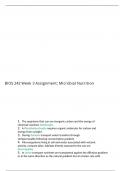
-
BIOS 242 Week 3 Assignment; Microbial Nutrition
- Other • 2 pages • 2024
-
- $8.49
- + learn more
BIOS 242 Week 3 Assignment; Microbial Nutrition The organisms that can use inorganic carbon and the energy of chemical reactions ______ . A ______ requires organic molecules for carbon and energy from sunlight. During ______ transport water transfers through semi permeable following concentration gradient. Microorganisms living in soil and water associated with volcanic activity, compost piles, habitats directly exposed to the sun are ______. In ______ transport nutrients are transported...
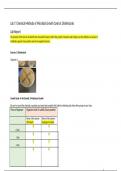
-
BIOS 242 Week 4 Assignment; Lab 7 of 14 Onsite; Disinfectants and Antibiotics
- Other • 6 pages • 2024
-
- $9.49
- + learn more
BIOS 242 Week 4 Assignment; Lab 7 of 14 Onsite; Disinfectants and Antibiotics Lab Report: Disinfectants and Antibiotics Purpose: Describe the purpose of the lab. Exercise 1: Disinfectants Organism 1: Be sure to record the chemical or product you tested and complete this table by obtaining data from other groups in your class Organism 2: Be sure to record the chemical or product you tested and complete this table by obtaining data from other groups in your class Q...
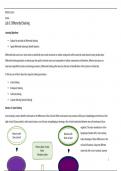
-
BIOS 242 Week 3 Assignment; Lab 5 of 14 Onsite; Differential Staining
- Other • 18 pages • 2024
-
- $9.99
- + learn more
BIOS 242 Week 3 Assignment; Lab 5 of 14 Onsite; Differential Staining Learning Objectives: Explain the principle of differential staining Apply differential staining to identify bacteria Differential stain uses two or more stains to specifically stain certain structures or cellular components which cannot be easily observed using simple stains. Differential staining principles are based upon the specific chemical nature and composition of cellular components and therefore, different s...
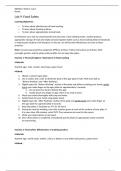
-
BIOS 242 Week 5 Assignment; Lab 9 of 14 Onsite; Food Safety.
- Other • 7 pages • 2024
-
- $9.99
- + learn more
BIOS 242 Week 5 Assignment; Lab 9 of 14 Onsite; Food Safety. Lab 9: Food Safety Learning Objectives: To learn about effectiveness of hand washing To learn about cleaning produce To learn about appropriately storing foods GI infections occur due to contaminated food and water. Clean drinking water, washed produce, appropriate storage of food and simple personal hygiene habits such as hand washing help tremendously in reducing the incident of GI infections. In this lab, we will test the ef...
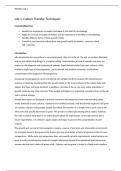
-
BIOS 242 Week 1 Assignment; Lab 1 of 14 Onsite - Culture Transfer Techniques
- Other • 9 pages • 2024
-
- $9.99
- + learn more
Lab 1: Culture Transfer Techniques Learning Objectives: Identify the importance of aseptic technique in the field of microbiology Apply the concept of aseptic technique and its importance in the field of microbiology. Identify different forms of basic growth media Transfer a pure bacterial culture from one growth media to another, a process called sub- culturing. Introduction: Microorganisms are everywhere in our environment; they are in the air, the soil, on surfaces (fomi...
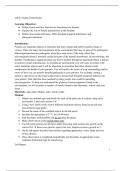
-
BIOS 242 Week 4 Assignment; Lab 8 of 14 Onsite; Fomite Transmission.
- Other • 2 pages • 2024
-
- $8.99
- + learn more
BIOS 242 Week 4 Assignment; Lab 8 of 14 Onsite; Fomite Transmission Learning Objectives: Define fomite and how bacteria are transferred via fomites. Explain the role of fomite transmission in the hospital. Define nosocomial infections, HAIs (hospital acquired infections), and Iatrogenic infections. Introduction: Materials: Agar plate, Marker, ruler, sterile swabs Method: Obtain one nutrient agar and divide the back of the plate into 8 sections using ruler and marker. Label ...

$6.50 for your textbook summary multiplied by 100 fellow students... Do the math: that's a lot of money! Don't be a thief of your own wallet and start uploading yours now. Discover all about earning on Stuvia


